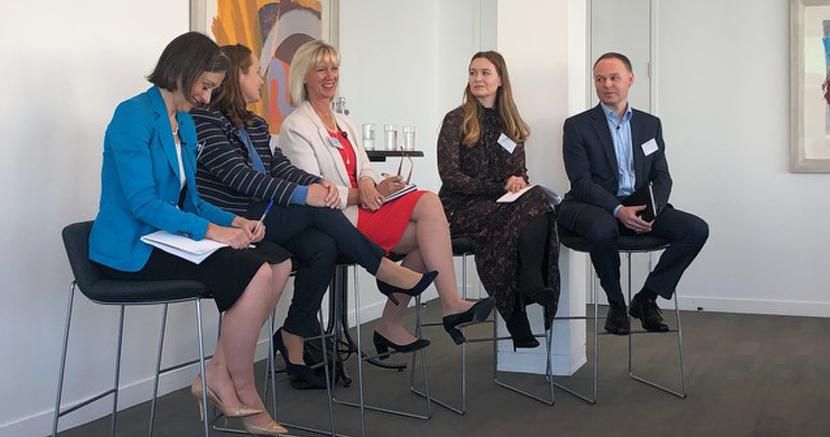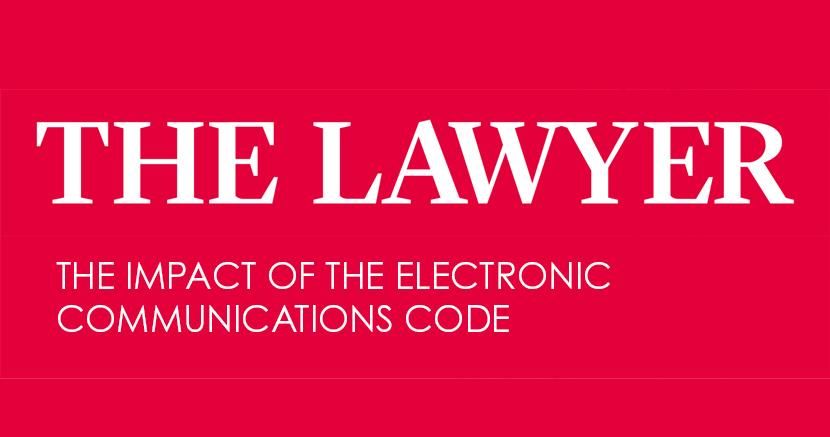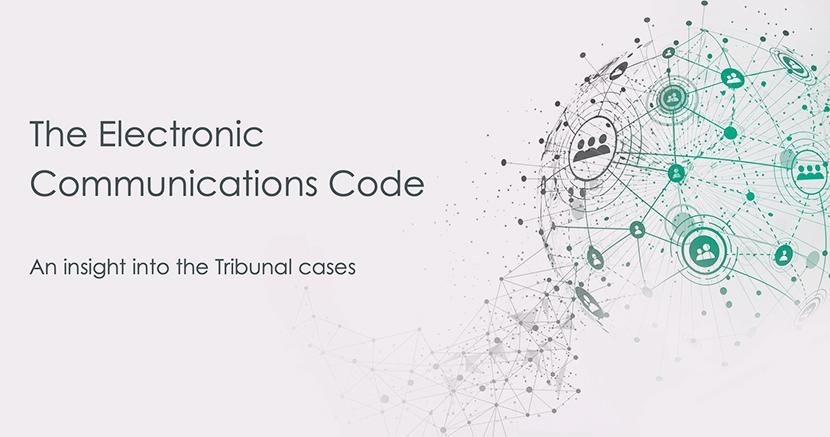In the case study below, Catarin Griffiths at The Lawyer interviews Carlos Pierce, Head of Legal Projects Strategy and The Code Programme at Cornerstone on the new Code legislation.
Direct access to barristers: the Cornerstone of a new approach
In-house lawyers at one infrastructure services company have responded to a new telecoms code by establishing direct relationships with barristers, in the hope of receiving a constant feed of new ideas.
In 2017, the new Electronic Communications Code (ECC) took effect with the express aim of facilitating the installation of telecoms infrastructure as part of a national upgrade of connectivity.
The code, which is part of the Digital Economy Act, confers rights on network and infrastructure providers to set up and maintain apparatus on, under or over public land. The code, which regulates the relationships between landowners and network operators, was intended to clarify the law and facilitate the sharing of physical equipment, and in practice has meant major changes to the way land is valued. Disputes are now heard in the Lands Tribunal rather than the county court, which has speeded up the process.
Given the potential uncertainty created by the new code, mobile infrastructure services company Cornerstone had already launched a dedicated ECC programme task force. This case study illustrates how Cornerstone set up an agile team that made use of direct access to barristers. ECC programme leader Carlos Pierce, head of strategic legal projects, worked with head of legal and compliance Phil Warren.
They reported directly to Belinda Fawcett, general counsel and director of property and estates, with a dotted line reporting to the CEO. The ECC task force aimed to:
- Agree consensual deals with landlords;
- Manage stakeholder relations within the Cornerstone business, in particular, shareholders Telefonica and Vodafone;
- Manage legal and property suppliers;
- Establish an industry standard form of agreement;
- Lobby and work with key industry bodies – the Government, landowner organisations such as RICS, British Property Federation, Country Land and Business Association and NFU, and The Law Society.
We needed to build a working relationship that was independent of the law firms, so that we were not entirely dependent on them” Carlos Pierce, Cornerstone.
Cornerstone’s ECC team kicked off a series of information-sharing initiatives, including operating an ECC queries email inbox and weekly surgery for colleagues across the business, delivering training both internally and externally to suppliers, and setting up a bi-monthly industry legal forum for lawyers and surveyors acting for both operators and landowners, and a cross-industry working group, including landowners, to develop a template agreement. Internally, the team created an online manual with guidance notes, template documents and operating processes.
“My team’s job is to guide, shape and transition the business,” says Pierce. “A programme comes to an end when this is just how we work. But to get there, we have to take the business through a transformation piece; so having standard documents, guidance notes, a manual explaining our approach, and why we are doing things in a certain way, is critical.
“We’re trying to change 25 years of working in a small timeframe, so inevitably, we are going to get challenges – internal as well as external. So having, to a certain degree, one source of truth, will and should allow people to continually help understand what and why we are doing.”
In particular, Cornerstone saw the importance of seeking precedents though taking a number of cases to the Lands Tribunal, in order to provide clarity for the industry. Cornerstone had already conducted a panel review which saw DAC Beachcroft and TLT winning the lion’s share of work. Following that review, Pierce looked further afield, at the company’s barrister resource. “Establishing a pool of barristers that we could rely on, that would be committed to operator work with whom we could build close working relationships, and who would work with us just like another supplier – e.g. external law firms – was going to be an essential part of the programme,” says Pierce.
“We needed to build a working relationship that was independent of the law firms, so that we were not entirely dependent on them. We recognised that this was a different way of working. But then we have an ambitious programme, and we need to think differently, work differently and challenge normal ways of working.”
Cornerstone had already been working with several barristers as part of the consultation around the Digital Economy Act. It then decided to increase both the pool, and the mix of expertise, from technical to strategic specialists.
“We wanted a blend of QCs and juniors while looking to bring in some baby junior counsel who, once the major cases are out of the way, will probably be doing most of the case management hearings. We also wanted counsel who would be prepared to commit to operator-only work, and who didn’t have landowner conflicts.”
The next step was therefore to broaden the mix. This evolved quite naturally, says Pierce, by trying different counsel on different items and by purposefully selecting, identifying different barristers with possibly different skill sets and experience, as well as age profiles.
“Building diversity was also essential,” notes Pierce. Indeed, while the barristers on the Lillian Penson Court of Appeal Hearing on 12 November 2019 (Cornerstone v University of London) will be all male (Jonathan Seitler QC of Wilberforce Chambers and Oliver Radley-Gardner of Falcon Chambers), the team on for Cornerstone v Compton Beauchamp at the Court of Appeal, where the case was dismissed against the company, was all female (Stephanie Tozer QC of Falcon and Myriam Stacey of Landmark Chambers).
But diversity was important in all senses of the word. “Given how litigious this was going to get, we also didn’t want all our eggs in one basket, with a concentration of knowledge with any one barrister or chambers,” Pierce comments.
Some of the counsel were already known to the Cornerstone team, but they also took soundings from law firms and other professionals. In addition to the above named barristers, Jonathan Seitler QC has also been involved. Most work is fixed either for a piece of work, or day rate. There is no fixed protocol, but there is certainly no requirement to instruct QCs.
“Of all of our cases, only two matters that went to the Tribunal have actually been led by a QC – including the case that was dismissed – Cornerstone v Compton Beauchamp,” Pierce says. “The others have been a mix, with perhaps Oliver Radley-Gardner maybe having a few more cases than others – it’s just the way it’s fallen.
“By the same token, sometimes, presentationally, we might actually want a junior. The judge does not want to see QCs, senior juniors running case management hearings. Where we might be taking an individual landowner/landlord to court, it doesn’t look good if we roll out heavyweights, particularly if they say they do not have the money to litigate.”
Cornerstone’s nuanced approach to using counsel was amplified by its flexible barrister secondment scheme. Two barristers are seconded to the legal team, much like a job share; one works exclusively for Cornerstone for two days a week, and another – from the same set – exclusively for two more days. They are not as such running the cases but are asked to undertake detailed legal research around key issues, as an extension of the in-house team.
So, in effect, rather than an external law firm giving Cornerstone a secondee, the company has barristers. “This came about because we identified a need to have someone who was very forensic, very detailed, providing critical support,” adds Pierce. “We realised it would take too long to recruit someone – it could take six months – they would take a few months to bed in, and then, honestly, we wouldn’t know if they were any good. This way, we were able to very quickly get the barristers on board.”
The reaction within the business was overwhelmingly positive, reports Pierce. “The business likes it because [it’s not] an FTE overhead and we’re thinking differently. We can turn this off at any time – within reason – and also, it says to the business that I am not building empires, teams of people around me. This is a common criticism of in-house legal teams. Staying lean is a challenge, but this way, we’re getting the work done, in a different way, but keeping FTE costs down. It’s progressive. It’s the first time I’ve done a barrister secondment, and it’s been excellent for us. The plan is to build on this, and perhaps share around other chambers.”
The business likes it because [it’s not] an FTE overhead and we’re thinking differently. We can turn this off at any time – within reason” Carlos Pierce, Cornerstone
Given what you know now, what would you have done differently?
- Start it sooner! Get people engaged earlier.
- Have a few more (quicker) meetings to get earlier engagement, and build collaboration.
- Ask for more input from barristers as to how to achieve collaboration.
So how does Cornerstone pick its counsel secondees?
Typically, it might ask a barrister to advise on a discrete piece of work, to gauge their appetite for a forensic approach to the code.
“As a dedicated internal team, we’re already subject-matter experts, so we need to stress-test whether our barristers are prepared to work with us in that way – i.e. testing, probing, being prepared to be challenged,” explains Pierce. “Asking them to see things in a different way: what does that paragraph really say? What was the intention of Parliament? What did Hansard say when going through Parliament? What did the Law Commission say?”
While most in-house lawyers who instruct counsel will do so on the basis of pure intellectual firepower, equally important are soft skills. “A lot of this is about personality, and choosing the right personalities. Sometimes you have to just make this happen. It’s about building a culture where everyone can see the benefits,” explains Pierce.
In another example, adds Pierce, Cornerstone brought a new barrister in to advise on something where the team had already formed a view. “We wanted to see whether our approach was correct, to see what we were missing,” he says. “Could we learn something? Could they become the ‘go-to’ person for a particular angle? In this way we may ask a barrister for their own complete opinion on this, and then take those learnings and use them elsewhere.
“We’re building a relationship with them that is different to the conventional. They’re become just like another supplier, a supplier with a different set of key skills that we need. They bring something different to external law firms.”
The ECC team has largely found its own way into its approach rather than adapt any existing model and monitors how the barristers interact and cross-share ideas. For example, one might prepare the first draft skeleton, and the other refine it. On another case, it might be the other way around. “We don’t want to see barristers keeping ideas to themselves, so sharing ideas and solutions is a great way to measure collaboration,” Pierce comments.
What would you advise someone to do when setting up a collaborative barrister panel?
- Be clear what you want to achieve.
- Move quickly.
- Try to involve as many people as possible – to build engagement, collaboration and a sense of involvement and belonging.
- Be prepared to challenge. Lawyers, barristers, (we all) like to do certain things a certain way, the way it has been done before. But keep challenging and probing to achieve what you want for the business.
He concludes with a mechanical metaphor. “If you think of the car you own, we all have a manual in the glovebox, but we hardly ever use it, because we know the car works,” he says. “OK, when something goes wrong we can look at the manual, but we hardly ever have to. This is different – we’re still testing, and stress-testing, and our approach is evolving/improving – so our teams and suppliers need to have that one source of truth. In time, as we establish precedent, and develop ‘the product’, the manual is there, for comfort, but it hardly ever gets used.”
In conclusion, if you test and hone your approach enough, running the machine becomes instinctive.
Download the full case study PDF here.












